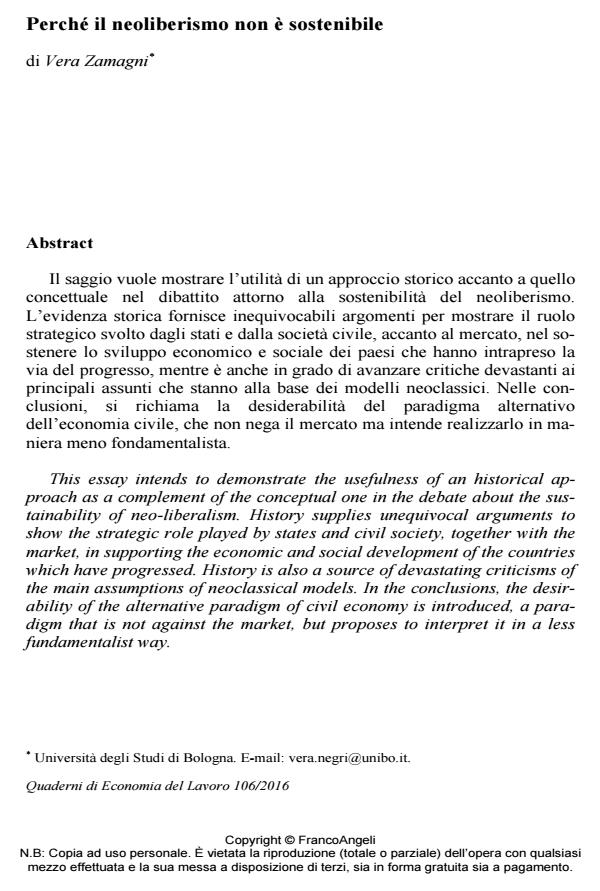Perché il neoliberismo non è sostenibile
Journal title QUADERNI DI ECONOMIA DEL LAVORO
Author/s Vera Zamagni
Publishing Year 2017 Issue 2016/106
Language Italian Pages 17 P. 13-29 File size 751 KB
DOI 10.3280/QUA2016-106002
DOI is like a bar code for intellectual property: to have more infomation
click here
Below, you can see the article first page
If you want to buy this article in PDF format, you can do it, following the instructions to buy download credits

FrancoAngeli is member of Publishers International Linking Association, Inc (PILA), a not-for-profit association which run the CrossRef service enabling links to and from online scholarly content.
This essay intends to demonstrate the usefulness of an historical approach as a complement of the conceptual one in the debate about the sustainability of neo-liberalism. History supplies unequivocal arguments to show the strategic role played by states and civil society, together with the market, in supporting the economic and social development of the countries which have progressed. History is also a source of devastating criticisms of the main assumptions of neoclassical models. In the conclusions, the desirability of the alternative paradigm of civil economy is introduced, a paradigm that is not against the market, but proposes to interpret it in a less fundamentalist way.
- Acemoglu D., Robinson J.A. (2013). Perché le nazioni falliscono. Alle origini di prosperità, potenza e povertà. Milano: Il Saggiatore.
- Barbera R.J. (2009). The cost of capitalism. Understanding market mayhem and stabilizing our economic future. New York: McGrawHill.
- Becchetti L. (2014). Wikieconomia. Manifesto dell’economia civile. Bologna: il Mulino.
- Biancofiore F. (2012). Un nuovo modo di fare impresa fra fraternità e reciprocità. Todi: Tau ed.
- Bruni L. (2014). Beati quelli che investiranno in economie di comunione. Milano: Ed. San Paolo.
- Bruni L., Zamagni S. (2015). L’economia civile. Un’altra idea di mercato. Bologna: il Mulino.
- Cattaneo C. (1843). Dell’economia nazionale di Federico List. In: Vertolino A., a cura di, (1956). Scritti economici, 2° vol.
- Chang H.-J. (2012). 23 cose che non ti hanno detto sul capitalismo. Milano: Il Saggiatore. (Ed. originale 2010).
- Chang H.-J. (2003). Kicking away the ladder. Development strategy in historical perspective. Londra: Anthem.
- Crouch C. (2011). The strange non-death of neoliberalism. Cambridge: Polity. (Trad. it.: 2014, Laterza).
- Donati P., Solci R. (2011). I beni relazionali. Che cosa sono e quali effetti producono. Torino: Bollati-Boringhieri.
- Harvey D. (2005). A brief history of Neoliberalism. Oxford: OUP.
- Kohli A. (2004). State-directed development. Political power and industrialization in the global periphery. Cambridge: CUP.
- Magatti M., Gherardi L. (2013). Una nuova prosperità. Milano: Feltrinelli.
- Mielants E.H. (2007). The Origins of Capitalism and the Rise of the West. Philadelphia: Temple University Press.
- Mishel L. (2012). The wedges between productivity and median compensation growth.
- Morgan G. et al., a cura di, (2010). The state in the economy: neoliberal or neoactivist? The Oxford handbook of comparative institutional analysis. Oxford: OUP.
- Nayyar D. (2007). Globalization and free trade: theory, history and reality. In: Shaikh A., a cura di, Globalization and the myth of free trade. History, theory and empirical evidence. Londra: Routledge.
- Nelson R.R. (2011). The complex economic organization of capitalist economies. Capitalism and Society, 6.
- North D.C. (1990). Institutions, Institutional Change, and Economic Performance. New York: Cambridge University Press.
- Piffaretty N. (2009). Reshaping the international monetary architecture: lessons from Keynes’ plan. World Bank Policy Paper, 5034.
- Rossi E., Zamagni S., a cura di (2011). Il Terzo Settore nell’Italia unita. Bologna: il Mulino.
- Shaikh A. (2007). Globalization and the myth of free trade. In: Shaikh A., a cura di, Globalization and the myth of free trade. History, theory and empirical evidence. Londra: Routledge.
- Sacconi L. e Ottone S., a cura di (2015). Beni comuni e cooperazione. Bologna: il Mulino.
- Schram S. (2015). The return of ordinary capitalism. Neoliberalism, precarity, occupy. Oxford: OUP.
- Streeck W., Yamamura K., a cura di (2001). The origins of non liberal capitalism. Germany and Japan in comparison. Ithaca: Cornell University Press.
- Streeck W. (2013). Buying time. The delayed crisis of democratic capitalism. Londra: Verso.
- Vries P. (2015). State, economy and the great divergence. Great Britain and China, 1680s-1850s. Londra: Bloomsbury Academic.
- Zamagni S. (2013). Impresa responsabile e mercato civile. Bologna: il Mulino.
- Zamagni S. (2009). La lezione e il monito di una crisi annunciata. Rivista di Studi Politici, 4.
- Zamagni S. e Zamagni V. (2008). La cooperazione. Bologna: il Mulino.
- Zamagni V. (2016). L’industria chimica. In: Gigliobianco A., Toniolo G., a cura di, Concorrenza, mercato e crescita in Italia: il lungo periodo. Venezia: Marsilio.
- Zamagni V. (2015). Perchè l’Europa ha cambiato il mondo. Bologna: il Mulino.
- Zamagni V. (2012). Stato Nazionale. In: Zamagni V. e Porta P., a cura di, Il contributo Italiano alla storia del pensiero. Economia. Enciclopedia Italiana. Appendice VIII. Roma: Treccani.
- Zamagni V. (a cura di) (2000). Povertà e innovazioni istituzionali in Italia dal Medioevo ad oggi, Bologna: il Mulino.
Vera Zamagni, Perché il neoliberismo non è sostenibile in "QUADERNI DI ECONOMIA DEL LAVORO" 106/2016, pp 13-29, DOI: 10.3280/QUA2016-106002